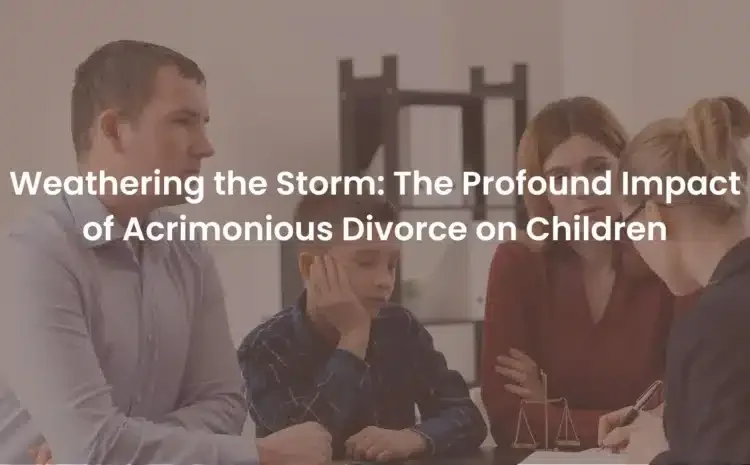Weathering the Storm: The Profound Impact of Acrimonious Divorce on Children
Introduction
Divorce is a complex and emotional journey that can have far-reaching effects, especially on the most vulnerable members of the family – the children. When divorce turns acrimonious, with hostility and conflict taking center stage, the impact on children can be profound and lasting. In this article, we delve into the repercussions of acrimonious divorce on children’s emotional, psychological, and overall well-being.
Emotional Turmoil: Acrimonious divorce can unleash a whirlwind of emotions for children. Witnessing their parents’ intense conflicts can leave them feeling anxious, confused, and overwhelmed. The emotional turmoil they experience can scar them deeply, affecting their sense of security and self-worth.
Stress and Anxiety: Constant exposure to hostility can elevate stress levels in children. They may be burdened with worries about the ongoing conflicts and the uncertainty of their future. Such stress can lead to anxiety, affecting their academic performance, friendships, and overall mental health.
Tug of Loyalties: Acrimonious divorces can inadvertently force children to take sides between their parents. Feeling torn between their love for both parents can create an internal conflict that can be emotionally taxing and distressing.
Deteriorating Parent-Child Relationships: The animosity between parents can spill over into the parent-child relationship. Children may feel caught in the crossfire, leading to strained relationships with both parents and a diminished sense of trust.
Long-Term Psychological Impact: The effects of acrimonious divorce can extend well into adulthood. Children who experience such divorces are at a higher risk of developing psychological issues such as depression, anxiety disorders, and difficulties in forming healthy relationships.
Impact on Social Skills: A tumultuous home environment can impede a child’s development of social skills. They may struggle with managing conflicts, communication, and emotional regulation, affecting their interactions with peers and authority figures.
Academic Performance: The emotional distress stemming from an acrimonious divorce can take a toll on children’s ability to concentrate and excel academically. This decline in performance can further contribute to feelings of inadequacy and low self-esteem.
Future Relationships: Children often model their understanding of relationships based on their parents’ behavior. Witnessing a hostile divorce can skew their perception of healthy relationships, potentially leading to difficulties in their own relationships in the future.
Mitigating the Impact
While acrimonious divorces can have detrimental effects, steps can be taken to mitigate the impact on children:
Minimize Exposure to Conflict: Shield children from the intensity of conflicts. Avoid arguing in their presence and communicate respectfully with your ex-partner.
Maintain Routine and Stability: Consistency is crucial for children during times of upheaval. Maintain familiar routines to provide a sense of stability.
Open Communication: Encourage your children to express their feelings and concerns. Let them know it’s okay to talk about their emotions and fears.
Professional Support: Consider involving therapists or counselors to provide a safe space for children to navigate their emotions and thoughts.
Co-Parenting Agreement: Work together with your ex-partner to establish a co-parenting agreement that prioritizes your children’s well-being and minimizes conflicts.
Conclusion
The impact of acrimonious divorce on children is a stark reminder of the importance of handling such situations with sensitivity and empathy. While parents navigate their own emotions, it’s essential to prioritize the well-being of their children. By fostering an environment of cooperation, open communication, and respect, parents can help mitigate the negative effects of divorce and pave the way for healthier, more resilient children who can thrive even in the face of adversity.

